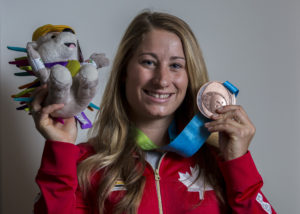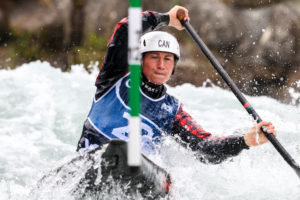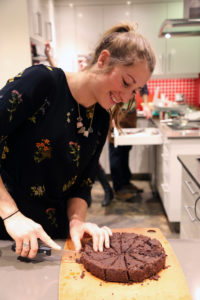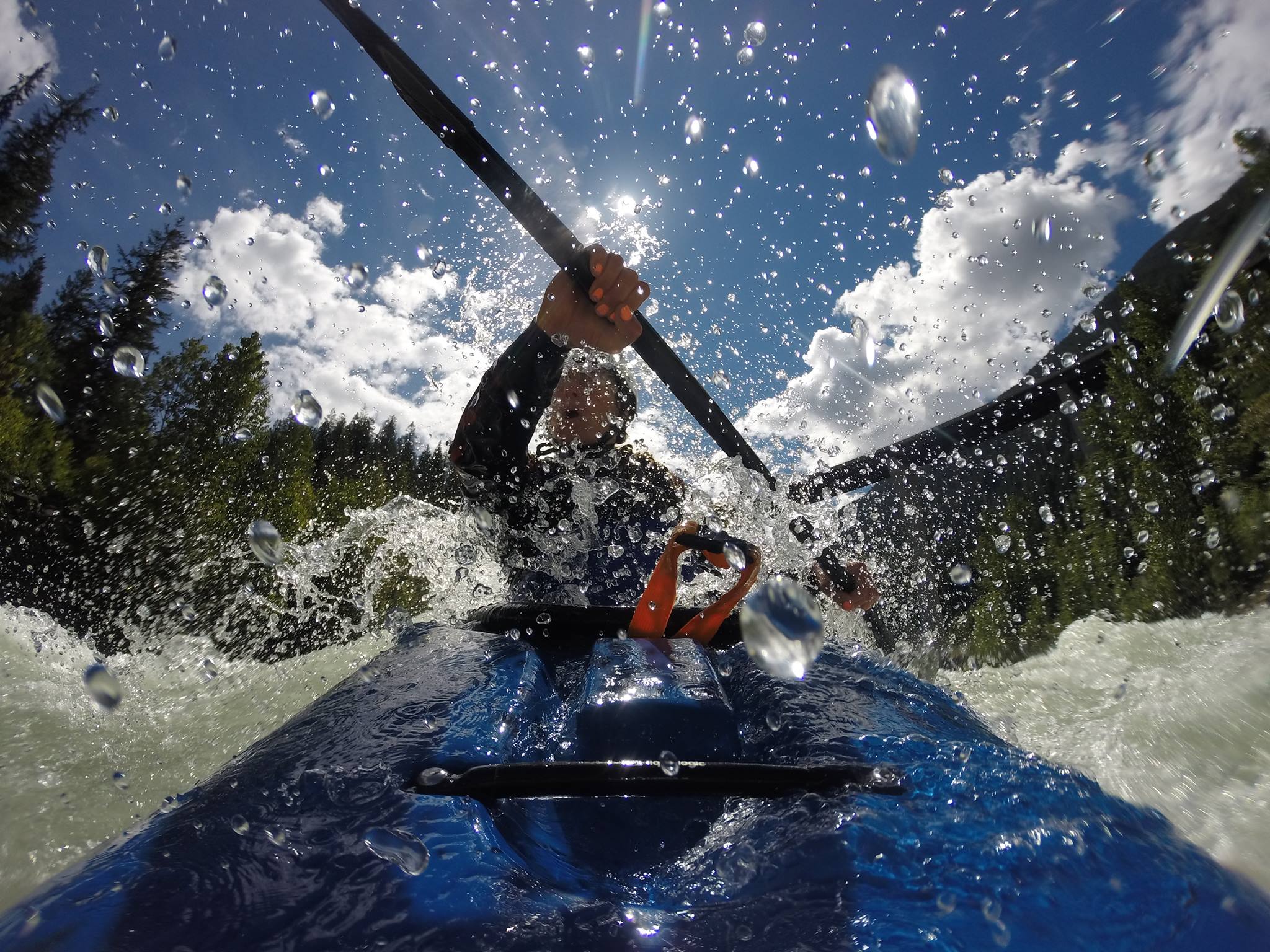Haley Daniels can’t go to the Olympics…yet
Professional athlete Haley Daniels lives in Alberta, Canada. The 25-year-old is fighting for a bid at the Olympics in an event that isn’t even on the schedule yet: Women’s canoe.
On the water
Although Haley grew up in the city, she was drawn to outdoorsy people. Her parents took her on many canoe trips as a kid, fostering a sense of adventure and love of nature. In 2005, at age 14, Haley began competing in canoeing. She tried C1 slalom for the first time in 2009, and joined women’s canoe when it entered the world circuit.
“I thought there would be more opportunities in canoe than kayak. Now I know there are fewer opportunities but I had already fallen in love – it was do or die,” Haley shared.
Solo canoes look a lot like kayaks, but they don’t have spray skirts. Instead, you sit on a saddle. While doing white water, Haley uses a paddle with two blades. Slalom canoeing involves strapping yourself in kneeling position and a paddle with only one blade. The boats are different also. Haley’s canoes are made of carbon kevlar and weigh in at about 8 kilos. The vessels cost around $5,000 and are only made in Europe.
“I would rather bang up my shoulders, scrape my knuckles or hit my head than hurt the boat,” Haley proclaimed. She did just that with some bloodied up hands in May in La Seu d’Urgell, Spain at the second World Cup. She grated her knuckles while navigating the fast water. You could still see the marks weeks later but she swears it looks worse than it feels.
Haley competes in slalom events where she makes her way down a whitewater course, navigating 18-23 gates and eddies with sheer physical force and know-how. She also partakes in creeking where she starts on a platform and pushes off, crashing into the water to paddle her way through the complex course. In her words, slalom is like alpine skiing – you make your way through. Creeking is akin to big mountain skiing – it has more challenging water features.
The athlete travels frequently for her sport, spending just over five months on the road in 2015. Since she’s been on the move less this year, Haley really appreciates the comforts of home like having her own car, bathroom, bed and not living out of a bag.
“A lot of people don’t realize you take these things for granted,” she shared. Haley will likely spend a total of around three and a half months on the road this year, having already spent several weeks in Europe for the World Cups in early June.
When not traveling for her sport, Haley admits to missing the many friends she has made on the paddling circuit.
“It’s full of people from around the world so you don’t get to see these friends who you love when you’re not on the road,” she lamented.
Haley sometimes travels with the three women on the Canadian national team who are from Calgary. Athlete Jessica Groeneveld is her close friend – they flew home from Europe together in June.
While Haley’s been competing since she was a teen, she has always loved the outdoors. She lives in the mountains in Calgary and takes every opportunity possible to get outside.
“I like to be one with nature,” she shared. “That’s something I love the most about our sport – you don’t leave a carbon footprint. When you go hiking you can see your footprints. When you ski you leave a ski trail. When you go paddling, you have such a low impact on the environment and you get to go places a lot of people will never see.”
While relaxed paddling is a great way to de-stress, Haley gets nervous leading up to a competition. “It’s funny, I was warming up an hour before the World Cup doing some flatwater stuff and I’m thinking to myself, ‘I hate racing.’ I hate the feeling of being nervous and having to calm myself down and putting so much pressure on myself to perform. Looking back, I always think of things I could change.”
She does love one thing about competing – what it teaches her. She’s learned how to be calm in stressful situations and how to focus on the task at hand. Through competition, Haley has gained major insight into how her mind works, knowing her body will react regardless of what’s happening. She referenced her mom saying that she always experiences the fight or flight response and has to reign it in.
Haley isn’t just a paddler. She refers to herself as a “serial activity person,” meaning she can’t sit still. This past year she took up mountain biking and climbing. She admits she’s much more comfortable on the water but she’s enjoying learning new things. She also does a ton of training for canoe season, like cross-country skiing in the winter and a two-hour round trip bike commute to work. She spends a lot of time in the gym on cross training and weight lifting as well. Paddling is largely about using your core to make tight turns around gates and avoid holes.

Marketing: An athlete’s necessity
Haley started college majoring in sociology because she loves working with people. She quickly realized that she had a knack for taking unique situations and making them into fundraisers, so she switched to a marketing major.
“I am an extremely underfunded athlete so I am forced to raise close to $50,000 a year,” she shared. The money covers travel, race fees, equipment and the many health factors of paddling, like working with sports therapists and nutritionists.
“I think everyone should have some marketing skills and a personal brand. What you act like around your employer, significant other or friends are all different aspects of your brand,” she noted.
Haley added that athletes have to be especially aware of their personal brand. “We’re in the public eye a lot and we are looked up to because we make a lot of sacrifices, so knowing that almost every action you take is going to be reflected on how you are perceived is important.”
She once received a sponsorship offer for nearly $50,000. She turned down the money that could cover nearly a years worth of competition expenses because she is a vegan and her priorities didn’t align with the sponsor’s.
“Learning what your values are, where you want your career to lie and what you want to represent is key,” she stated. “Some athletes go into it for the money and they don’t realize what the money represents.”
Social media also plays a huge role in Haley’s fundraising and interactions with fans, both in negative and positive ways. She says Instagram and Snapchat have changed her life. These platforms allow her to connect with different people and brands for sponsorships and partnerships.
“Being part of a community is great!” she shared. “Yeah, it can lead to free stuff for doing a post but mostly I love meeting cool people. It’s neat to know you’re pursuing your passions and other people are inspired by that.”
Right before we talked to Haley she was biking home in pouring rain and hail from her job with the Bank of Montreal. It was storming fiercely and she considered stopping, not to seek shelter from the hail and downpour, but to take a Snapchat.
“Then I thought, ‘Girl! You gotta get home!'” She exclaimed.
Social media isn’t all fun, though. The athlete shared that posed shots with gear, for example, can feel super unnatural. She referenced an Instagram post where she runs past the camera in some cool duds from Carbon38.
“It’s funny, you don’t see the behind-the-scenes stuff. I had done three workouts that day and was extremely tired but I went on a hike to get that photo. I was freezing and kept putting my jacket back on,” she noted.
Before a big competition, Haley will sometimes avoid social media for several days. While it’s a helpful way to connect with fans, she also feels mounting pressure to perform and can benefit from taking a step back. If women’s canoe makes it to the Olympics in the future, she plans to go on a social hiatus preceding her event.
Sexism in slalom
In mid-January 2016, the Canadian governing body of paddling stated, “The International Canoe Federation (ICF) has approved a race program highlighting gender equality at the 2020 Olympic Games.” The program included women’s canoe sprint C-1 (200 meters) and C-2 (500 meters), as well as women’s canoe slalom C-1 (200 meters).
The ICF optioned six men’s and six women’s events stating there would be eleven athletes from each gender. After this momentous press release, the International Olympic Committee met to discuss the upcoming 2016 games in Rio de Janeiro. Armed with the ICF’s options, they chose not to include women’s canoe.
“It is an interesting time for women in the outdoor industry,” Haley shared. “There is a lot of butting heads between the genders. I just want to be treated as an equal.”
When a national team of athletes is headed for the Olympics, they are allotted specific funds. Athletes on the Canadian Men’s Canoe Team receive close to $30,000 a year for physiotherapists, nutritionists, school support and gear. Other crucial aspects of their training are also paid for. As of right now, the women get nothing, but this is the first year they are eligible for funding – a step in the right direction.
What does this mean for Haley? She has to seriously amp up her funding game.
“We pay for all our own stuff and that makes it a lot harder,” Haley said. “I wish there was another reason but they didn’t feel there needed to be gender equality. They also took their time to come to a decision and it was to our detriment. We put a lot of pressure on them and tried to get it into the media.”
The team tactics seem to have worked. The women’s canoe team is no longer fighting for a bid for the 2020 Olympics. They are awaiting the IOC congress to approve – they’re basically awaiting sanction.
If the Tokyo bid is a go, female canoeists already know who’s likely to head to the games. The 2016 season was racing for carding, which includes funding from the government. Haley did not score high enough to meet those goals.
“I put so much pressure on myself that I held myself back. I focused on the outcome instead of the task at hand. It’s been a really hard thing to be a part of because every day I have to push myself harder than the men do.”
Haley added that women are constantly called amateurs instead of professional athletes if they’ve never taken part in the Olympics.
“We train just as hard if not harder than every other Olympic athlete,” she proclaimed. “The games are like the golden ticket – it’s a label like a degree but there are people who are smarter than those with degrees. It’s a gateway to the public eye.”
Haley is on the branding committee that provides input for AthletesCAN which speaks up for athletes across national sports teams. She wants to potentially become a part of the National Olympic Committee one day. This position would allow her to push for LGBTQ and women’s rights.

Living the dream
Haley hopes to one day “just be an athlete.” Currently, she has two jobs and does public motivational speaking, all while constantly training for upcoming canoe events and attending classes.
“I would love to train and completely focus my efforts,” she shared.
The athlete has one year left of school and then hopes to spend the next four years as an athlete. She cites her inability to sit still as a reason she’ll likely try to work with a big brand like GoPro or Red Bull as a marketer.
Upon graduation, Haley may have a chance to continue working with the Bank of Montreal. She’d help with sponsorship marketing – on the opposite side of the spectrum. Instead of asking for funds to fuel her season, she’d be doling them out.

‘Canoeist Kitchen’
Haley started a vegan lifestyle four years ago when she became allergic to eggs completely out of the blue. This spurred her to try cutting out all meat, dairy and eggs.
“I felt awesome,” she exclaimed. “I felt overall better, had a faster recovery time and was just happier.”
The athlete misses home-cooked meals while traveling because of her dietary restrictions. She calls herself a “marketed vegan” because she prefers to avoid all animal products but does divert from veganism on occasion.
“At an event a couple of months ago I really wanted a McFlurry but I knew my teammates would make fun of me so I snuck off to eat it without them,” she admitted. “They caught me and Snapchatted photos of me labeled ‘murderer.'”
While this incident was all in good fun and the team really doesn’t care if she’s vegan or not, the vegan community can get intense. Haley noted that it’s kind of like a religion.
“At the end of the day, food is food. It’s fuel. Do what makes you feel good,” she shared.
A friend of Haley’s suggested creating a cookbook when the duo were brainstorming fundraising ideas for the 2015 season. When the athlete realized how many people found it fascinating that she is both an athlete and a vegan, she gave the idea a shot. Thus, “Canoeist Kitchen” was born.
Haley says her cookbook includes 25 recipes made up of ingredients you buy at a normal North American grocery store. She also teaches cooking lessons at the Paintbox Lodge in Canmore. The owners, Olympic medalist Sara Renner and World Cup Champion Thomas Grandi, are no strangers to the paddling world. All proceeds from Haley’s courses go towards her competitions.
The future
In September, Haley is eligible to compete in two World Cups. She’ll spend the summer training for them, and hopes to go to the Olympics when women’s canoe is finally a sanctioned event. If pressuring the media works out, she could race for a podium spot in Tokyo at age 29.
“I want to continue competing and having fun until I retire from being an athlete. Then I’ll have to figure out what life is like afterward. As much as I love gallivanting the world and being really fit, I know there is more to life,” she added.
Haley would like to own her own business and work for herself while staying in shape. She’s already starting a marketing business with her best friend to connect influencers on social media with big companies.
“I hope my dedication to sport will be something that transfers over to dedication to a family, career and friends,” she shared. “I hope I have that same passion for something else.
You can follow Haley:
On the web – http://www.haleydaniels.ca/
Instagram and Snapchat – @Haleydanski
Facebook – https://www.facebook.com/haley.h.daniels

